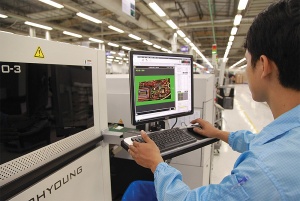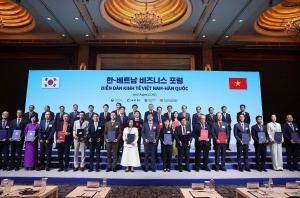INTERNATIONAL INVESTMENT
AND PORTAL
The event underscored a shared commitment to innovation, economic resilience, and long-term partnerships.
Vu Quoc Huy, director general of Vietnam’s National Innovation Centre, highlighted the importance of semiconductors in Vietnam’s broader transformation agenda.
He highlighted Vietnam’s commitment to creating favourable conditions for foreign investment, especially in high-tech industries. “We prioritise high-quality investment in sectors like semiconductors, AI, and research and development (R&D). The Vietnamese government is committed to improving the investment environment and offering strong support to UK enterprises looking to expand in our fast-evolving innovation landscape.”
Vietnam is entering a pivotal moment as it prepares to embark on a new era with double-digit growth targets. To seize this opportunity, the country is promoting digital transformation, green transition, and the advancement of science, technology, and innovation. The semiconductor industry plays a key role in this journey, especially in the age of AI and digitalisation.
Vietnam has set ambitious national targets, aiming to raise R&D investment to 2 per cent of GDP and move into the top 40 on the Global Innovation Index. To achieve this, the government has introduced a comprehensive policy framework, such as Resolution No.57-NQ/TW on science and technology breakthroughs, along with national strategies to develop a skilled semiconductor workforce.
British Ambassador to Vietnam Iain Frew emphasised the UK’s strengths in chip design, advanced packaging, and compound semiconductors.
“The UK brings deep expertise across the semiconductor value chain. Our ecosystem includes over 140 design and IP companies, and the world’s first compound semiconductor cluster,” he said. “We see Vietnam’s innovation landscape evolving rapidly and recognise the immense potential for collaboration.”
Both nations are aligning technology with their national growth strategies, creating natural opportunities for cooperation. Ambassador Frew noted, “Semiconductors are central to the UK’s Industrial Strategy, and we are eager to explore long-term, mutually beneficial partnerships that support innovation, skills development, and resilient supply chains.”
John Warland, first secretary for digital economy and technology at the British Embassy, reinforced the UK’s strategic approach to semiconductors as part of its broader industrial roadmap.
“The UK’s Industrial Strategy 2025 is a ten-year plan focused on increasing business investment and supporting future industries,” he explained. “We are doubling down on our strengths, such as R&D, chip design, and compound semiconductors, to drive innovation and global partnerships.”
The UK is home to five major semiconductor clusters, including South Wales, Cambridge, Bristol, Scotland, and the Northeast, each with unique strengths in photonics, materials, packaging, and design. This expertise will underpin various joint efforts already underway.
Warland outlined several initiatives that are building momentum, like UK-led training courses to support Vietnam’s workforce development goals; strategic partnerships to deploy UK semiconductor technologies across Vietnamese sectors like clean energy and AI; joint research and exchange programmes in chip design and advanced packaging; and collaborative R&D projects that align UK research capabilities with Vietnam’s dynamic tech ecosystem.
![]()
A representative from the University of Liverpool shared insights into the university’s research, training, and collaboration capabilities in chip design, semiconductor materials, and photonic devices. Meanwhile, a representative from Oxford Instruments introduced solutions for the analysis and fabrication of semiconductor materials and critical minerals.
On the Vietnamese side, representatives from Vietnam National University, Hanoi University of Science and Technology, FPT Semiconductor, and CT Semiconductor emphasised their commitment to supporting training, research, and semiconductor product development, with the goal of deeper integration into the global supply chain. Both sides had the opportunity to meet, connect, exchange information, seek potential partners, and build collaborative relationships.
UK companies and institutions expressed their strong willingness to cooperate and support Vietnam in developing strategic industries such as semiconductors and fostering an innovation ecosystem. These efforts aim to strengthen and advance the Vietnam-UK partnership in a substantive, effective way that delivers tangible benefits for both sides.
This workshop builds on growing bilateral engagement. Earlier this year, the British Embassy led the first UK semiconductor mission to Vietnam, fostering promising collaborations in Danang and Quy Nhon. In parallel, broader tech cooperation has gained pace through events like UK-Southeast Asia Tech Week in Ho Chi Minh City and Vietnam’s active participation in London Tech Week.
A key milestone is the UK-Vietnam iTechPath 2025 initiative, launched by the British Council under the Going Global Partnership. Focused on semiconductors, it will support joint university projects and long-term academic-industry collaboration.
As the global semiconductor race accelerates, the UK and Vietnam are forging a forward-looking alliance, built not just on economic interest but on mutual respect, innovation, and a vision for sustainable, high-tech development.
At a conference on digital twins for Vietnam's semiconductor workforce in Hanoi on June 12, industry experts declared Vietnamese workers to be its greatest advantage, which will be supported further by digital twin technology.
Vietnam’s semiconductor and electronics sector is gaining momentum, fuelled by rising global demand and government support. Do Thi Thuy Huong, an executive board member of the Vietnam Electronic Industries Association, spoke with VIR’s Hoang Oanh about key strategies to develop a globally competitive ecosystem.
 Wholesale approach to aid chip goals
Wholesale approach to aid chip goals
Efforts must be stepped up to strengthen links among universities, businesses, and government agencies to build a comprehensive ecosystem for semiconductor workforce development, experts have warned.
 FPT partners with ABOV Semiconductor on chip development
FPT partners with ABOV Semiconductor on chip development
FPT has signed strategic agreements with ABOV Semiconductor and Gachon University to advance semiconductor technology development and foster high-quality human resource training between Vietnam and South Korea.



















